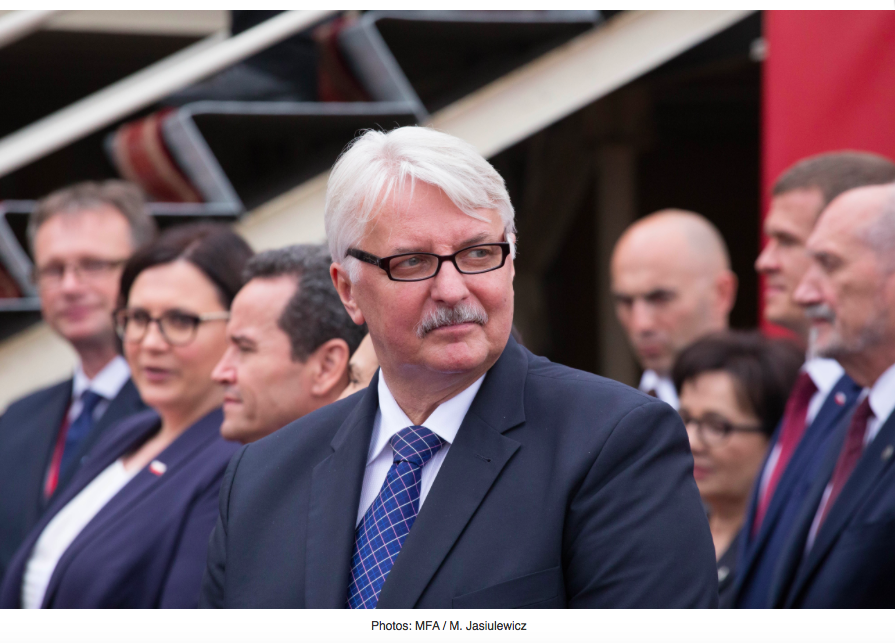BBG Watch
Russia using history as propaganda, Polish FM warns
By Ted Lipien

In an interview with Polish television channel Republika, Poland’s Foreign Minister Witold Waszczykowski warned that Russia has ambitious plans to commemorate next year’s 100th anniversary of the 1917 Bolshevik Revolution with historical propaganda designed to obscure what he implied but did not say were the revolution’s murderous consequences. Minister Waszczykowski, a diplomat with a degree in history, used diplomatic language, saying that Poland’s neighbor to the east “is conducting a very assertive history policy.” Russia “wants to commemorate next year the anniversary of its great revolution but does not say further what kind of revolution it was,” Waszczykowski added. He commented that Moscow wants to show 1917 as one great revolutionary year in Russia without specifically mentioning the Bolshevik Revolution. Minister Waszczykowski said he assumes Russia will try to present the revolutions of 1917 as having brought positive changes in the world.
Polish foreign minister warned that countries need to have what he called “history policy” or they risk having other countries’ history narrative take precedence. Minister Waszczykowski has a Master’s and PhD degrees in history from the University of Łódź in Poland and a Master’s degree in international studies from the University of Oregon in the United States. During a visit to U.S. West Coast last month, Minister Waszczykowski discussed Poland’s “history diplomacy” with representatives of the Polish-American community in Portland, OR and met with the president and staff of the University of Oregon, in Eugene, OR.
There were two revolutions in Russia in 1917. The February Revolution led to the abdication of Tsar Nicholas II and the creation of the Provisional Government with a democratically-elected executive and constituent assembly. The February Revolution was followed in the same year by the October Revolution, led by the Bolsheviks, which paved the way for the Soviet Union. In his April 2005 state of the nation address, President Vladimir Putin called the eventual collapse of the Soviet Union “the greatest geopolitical catastrophe of the century.”
While estimates of the death toll of the communist revolution and rule in the Soviet Union and communist revolutions in other countries led or inspired by the Soviet regime vary widely, they are believed to be in tens of millions. In the spring of 1940, the Soviet secret police NKVD executed some 21,857 Polish POWs and intellectual leaders in what has become known as the Katyn massacre. The collectivization of farms and droughts, which caused the famine of 1932–1933, known in Ukraine as the Holodomor, are believed to have caused the death by starvation of several million people. The Soviet Union was also behind communist domination of East Central Europe, where Moscow-backed repressive regimes ruled for several decades after World War II. They were also responsible for mass killings. All of these historical events can be traced back to the communist takeover of power in Russia in 1917.
Minister Waszczykowski’s comments about the need for “history diplomacy” in information programs as they relate to Vladimir Putin’s Russia could be useful to know for U.S. public diplomacy experts at the State Department and officials in charge of the Broadcasting Board of Governors (BBG). The BBG is the federal agency responsible for such U.S. taxpayer-funded media outreach outlets serving international audiences as the Voice of America (VOA) and Radio Free Europe/Radio Liberty (RFE/RL).
 Ted Lipien, tedlipien@gmail.com, a former VOA Polish Service director and former acting VOA associate director, is one of the co-founders and supporters of BBG Watch. Born in Poland and educated in the United States, he is the author of “Wojtyła’s Women: How They Shaped the Life of Pope John Paul II and Changed the Catholic Church,” Circle Books, UK (June 2008). The book was published in Poland by Swiat Książki in 2010: “Wojtyła a kobiety.”
Ted Lipien, tedlipien@gmail.com, a former VOA Polish Service director and former acting VOA associate director, is one of the co-founders and supporters of BBG Watch. Born in Poland and educated in the United States, he is the author of “Wojtyła’s Women: How They Shaped the Life of Pope John Paul II and Changed the Catholic Church,” Circle Books, UK (June 2008). The book was published in Poland by Swiat Książki in 2010: “Wojtyła a kobiety.”
